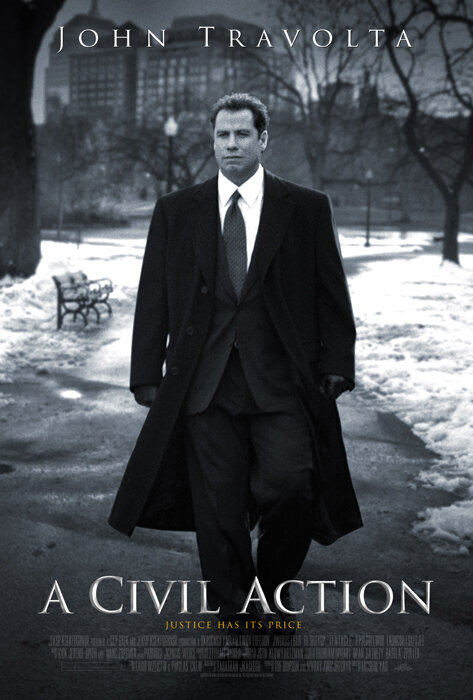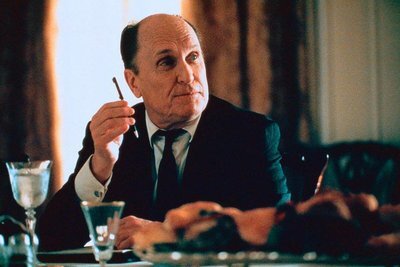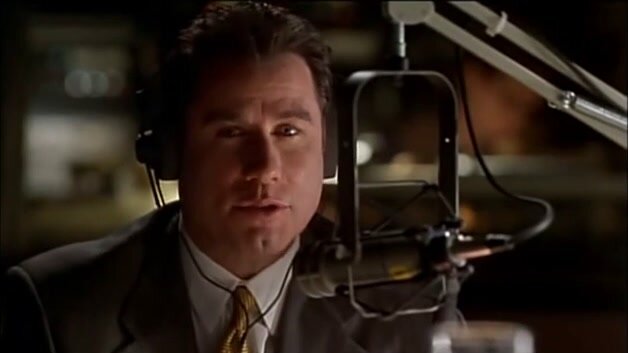The Travolta/Cage Project #57 A Civil Action (1998)
Memory can be a tricky thing, particularly if you smoke a great deal of marijuana. It’s not at all unusual for me to find out about some bizarre cinematic obscurity and Google it, only to discover that the first entry is a review of it I wrote for The A.V Club.
I vaguely remembered seeing 1998’s A Civil Action at the time of its release and possibly even reviewing it but other than that I remembered absolutely nothing about it.
Having just re-watched it for this column and the Travolta/Cage podcast I can think of it at least three good reasons I almost instantly forgot A Civil Action despite it being a damn good movie starring a dude I love so much I’m spending years watching all of his movies as well as those of one-time costar Nicolas Cage.
First and foremost I probably forgot A Civil Action because it’s called A Civil Action. Jesus fucking Christ! It would be hard to think of a more boring, forgettable and dry name for a legal drama than A Civil Action. It might as well be called A Legal Proceeding orTort Litigation.
True A Civil Action is based on a best-selling non-fiction book of the same name that’s taught in law school, ensuring that the movie will mean way more to lawyers than anyone else but the filmmakers would have been justified in choosing a title that wasn’t both achingly non-commercial and destined to make everyone who hears it fall asleep instantly out of boredom.
Secondly, I suspect that I forgot about A Civil Action despite it being a film of genuine quality filled with memorable scenes and performances, most notably Robert Duvall’s Academy-Award nominated turn as Jerome Facher, a brilliant and absolutely ruthless legal shark with a deceptively folksy persona as a plain-spoken, humble man of the people.
Jerome is also a hilariously cheap miser who carries around a beat-up old briefcase held together with tape rather than spring for a new one. In perhaps my favorite moment in a movie full of wonderful moments Jerome waits until his high-powered, insanely rich contemporaries are distracted crunching the numbers for a case worth millions, if not tens of millions of dollars, to shove a hotel croissant into his suit pocket and then ask if he can keep one of the hotel’s pens.
Being a high flying legal eagle, Duvall’s cunning antagonist is undoubtedly worth a small fortune yet he seems to derive as much pleasure and satisfaction from purloining a seventy-five cent croissant and three dollar pen from a hotel that won’t miss them as he does from winning a huge case.
Even in a cast that includes Travolta (of course) at his slickest and finest, William H. Macy, Tony Shalhoub, Kathleen Quinlan, Sydney Pollack (legal drama royalty thanks to his direction of The Firm), Daniel von Bargen, John Lithgow, Dan Hedaya, Travolta/Cage All-Star James Gandolfini, Stephen Fry and, just for the sake of overkill, an uncredited cameo from Travolta’s Primary Colors costar Kathy Bates at the very end, this is unmistakably Duvall’s film.
Duvall is so wonderful that his absence from the film’s third act speaks to the third reason I forgot about A Civil Action. Movies that end strongly are invariably more fondly remembered than movies that start strongly but fizzle out at the end, as A Civil Action does.
That’s why Honeymoon in Vegas is beloved for its Flying Elvises climax while A Civil Action is forgotten even by people who like it. A Civil Action gets off to a terrific start only to end on a distinct anti-climax that finds Travolta’s crusading personal injury lawyer seemingly losing everything, only to win big in a more abstract way.
A Civil Action opens with narration from slick personal injury attorney Jan Schlichtmann (Travolta) coldly laying out the geometry of personal injury law. When it comes to getting the most for clients, white married men are at the very tippy top of the pyramid, because they are valued the most highly by society and children occupy a spot at the bottom because their earning potential is purely theoretical and consequently from a legal perspective their value is damn near non-existent.
Judging exclusively by their clothes, attitude and general demeanor you would have to assume that Jay, the movie star handsome, charismatic lawyer with the sports car, designer suits and spot as one of his city’s ten most eligible bachelors was the sleek corporate shark and that Jerome, who packs a sack lunch to work every day and listens to his beloved Boston Red Sox on a primitive transistor radio, was the lovable underdog, a plucky legal David taking on intimidatingly powerful Goliaths.
In actuality the opposite is true. The slick legal stud is, in fact, an eternal underdog while the seemingly unassuming old timer is actually a brilliant corporate player.
Casting Travolta as a hard-charging, ferociously ambitious lawyer is inspired because superstar attorneys are a lot like movie stars: dazzling performers who make big bucks convincing audiences that what they say is true and right and the absolute truth no matter how far-fetched it might seem.
As A Civil Action opens our hero’s bank account is full but his soul is empty. He’s a very successful, ruthlessly pragmatic businessman and keen student of human psychology who doesn’t even bother trying to hide the fundamentally mercenary nature of what he does.
It’s about money and skillfully manipulating an incredible complicated system hopelessly rigged for people in power.
Good looking motion picture
Then one day he stumbles upon what initially seems to be a distinctly unpromising case: a disproportionate number of children in a small town are dying of Cancer and the tap water brimming with carcinogens might just be to blame. As Jan informed us earlier, dead kids tug at a jury’s heartstrings but tend not to open pocketbooks.
But when the workaholic lawyer figures out that the tanneries possibly causing Cancer in children belong to massive corporations Beatrice Foods Company and W. R. Grace and Company he smells a potentially massive payday and takes on the case.
It’s an uphill battle. Judge Walter J. Skinner (John Lithgow), the towering, intimidatingly aristocratic judge overseeing the case treats Jan like an obnoxious interloper who wandered into a party he wasn’t invited to and refuses to leave.
A Civil Action has a fine eye for the nuances of class. To the rest of the world Jan might be the very epitome of a fabulously successful lawyer with the world at his feet—gorgeous clothes, expensive car, Ivy League education—but for genuine players like Judge Skinner and Jerome he’s a gauche nouveau riche pretender who was most assuredly not invited to the boy’s club that is the legal profession at its highest echelons but crudely decided to crash anyway.
When Jerome is forced to sheepishly confess to a big-time legal hotshot played by the always terrific Sidney Pollack—at the Harvard Club, embarrassingly enough–that he graduated from Cornell and not Harvard Pollack’s Harvard man gives him a look that combines pity and faint disgust, the same way he would if the younger lawyer had instead conceded that he was illiterate and had just pooped himself.
Despite the slim odds and formidable competition, Jan becomes utterly obsessed with the case and devotes pretty much all of his small firm’s time and money and energy and resources to it, much to the mortification of his more conventional and conservative colleagues.
Macy stands out in a ridiculously stacked cast as the firm’s increasingly exhausted and defeated moneyman, a juicy role that plays to the character actor’s genius for conveying desperation and defeat.
At a certain point the case stops being about money for Jan and becomes about something much bigger and more abstract: redemption and salvation and genuinely striking a blow for the little guy against sinister corporate malfeasance.
Despite good but not glowing reviews and sub-par box-office (the title might have been to blame) A Civil Action picked up two Academy Award nominations: one for Duvall for one of the best performances of his extraordinary career and one for Conrad Hall for best cinematography.
A Civil Action is an extraordinarily well-crafted movie. What would you expect from the screenwriter of Schindler’s List and the cinematographer of Butch Cassidy and the Sundance Kid?
Hall gives the movie a timeless sheen that damn near makes it impossible to tell that the movie takes place in the 1980s, with the trial taking place in 1986. It’s an unusual choice but one that ultimately pays off.
Too much period detail might have proven distracting but it would have been nice if the movie had done anything to convey that it took place during the Reagan era and not the present. Would it have killed the filmmakers to have Travolta rap the “Super Bowl Shuffle” as a comic interlude? He’s great here but he’d be even better if he got a chance to sing, dance and/or rap.
I was pleasantly surprised by how thoroughly A Civil Action exceeded my modest expectations. I do not care for legal dramas as a genre but if they were all as smartly written, brilliantly acted and beautifully shot as A Civil Action that would definitely not be the case.
Pre-order The Joy of Trash: Nathan Rabin’s Happy Place’s Definitive Guide to the Very Worst of Everything and get access to original articles AS I write them and plenty more bonus stuff like exclusive cards featuring Felipe Sobreiro’s amazing artwork for the book at https://the-joy-of-trash.backerkit.com/hosted_preorders/cart
Help ensure a future for the Happy Place during an uncertain era AND get sweet merch by pledging to the site’s Patreon account at https://www.patreon.com/nathanrabinshappyplace
Also, BUY the RIDICULOUSLY SELF-INDULGENT, ILL-ADVISED VANITY EDITION of THE WEIRD ACCORDION TO AL, the Happy Place’s first book. This 500 page extended edition features an introduction from Al himself (who I co-wrote 2012’s Weird Al: The Book with), who also copy-edited and fact-checked, as well as over 80 illustrations from Felipe Sobreiro on entries covering every facet of Al’s career, including his complete discography, The Compleat Al, UHF, the 2018 tour that gives the book its subtitle and EVERY episode of The Weird Al Show and Al’s season as the band-leader on Comedy Bang! Bang!
Only 23 dollars signed, tax and shipping included, at the https://www.nathanrabin.com/shop or for more, unsigned, from Amazon here








